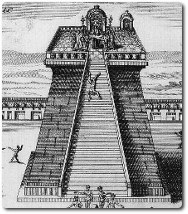The Handmaid's Tale Contents
- Interpretation and the opening epigraphs
- Section 1: Night - Chapter one
- Section 2: Shopping - Chapter two
- Section 2: Shopping - Chapter three
- Section 2: Shopping - Chapter four
- Section 2: Shopping - Chapter five
- Section 2: Shopping - Chapter six
- Section 3: Night - Chapter seven
- Section 4: Waiting room - Chapter eight
- Section 4: Waiting room - Chapter nine
- Section 4: Waiting room - Chapter ten
- Section 4: Waiting room - Chapter eleven
- Section 4: Waiting room - Chapter twelve
- Section 5: Nap - Chapter thirteen
- Section 6: Household - Chapter fourteen
- Section 6: Household - Chapter fifteen
- Section 6: Household - Chapter sixteen
- Section 6: Household - Chapter seventeen
- Section 7: Night - Chapter eighteen
- Section 8: Birth Day - Chapter nineteen
- Section 8: Birth Day - Chapter twenty
- Section 8: Birth Day - Chapter twenty-one
- Section 8: Birth Day - Chapter twenty-two
- Section 8: Birth Day - Chapter twenty-three
- Section 9: Night - Chapter twenty-four
- Section 10: Soul scrolls - Chapter twenty-five
- Section 10: Soul scrolls - Chapter twenty-six
- Section 10: Soul scrolls - Chapter twenty-seven
- Section 10: Soul scrolls - Chapter twenty-eight
- Section 10: Soul scrolls - Chapter twenty-nine
- Section 11: Night - Chapter thirty
- Section 12: Jezebel's - Chapter thirty-one
- Section 12: Jezebel's - Chapter thirty-two
- Section 12: Jezebel's - Chapter thirty-three
- Section 12: Jezebel's - Chapter thirty-four
- Section 12: Jezebel's - Chapter thirty-five
- Section 12: Jezebel's - Chapter thirty-six
- Section 12: Jezebel's - Chapter thirty-seven
- Section 12: Jezebel's - Chapter thirty-eight
- Section 12: Jezebel's - Chapter thirty-nine
- Section 13: Night - Chapter forty
- Section 14: Salvaging - Chapter forty-one
- Section 14: Salvaging - Chapter forty-two
- Section 14: Salvaging - Chapter forty-three
- Section 14: Salvaging - Chapter forty-four
- Section 14: Salvaging - Chapter forty-five
- Section 15: Night - Chapter forty-six
- Historical notes
- Human relationships in The Handmaid's Tale
- Mothers and children in The Handmaid's Tale
- Individualism and identity in The Handmaid's Tale
- Doubling in The Handmaid's Tale
- Gender significance and feminism in The Handmaid's Tale
- Power in The Handmaid's Tale
- Survival in The Handmaid's Tale
- Hypocrisy in The Handmaid's Tale
- Myth and fairy tale in The Handmaid's Tale
- Structure and methods of narration
Section 12: Jezebel's - Chapter thirty-two
Synopsis of chapter thirty-two
Offred goes into the kitchen and asks Rita for a match. Then she goes up to her room to smoke the cigarette - but realises that hiding the match instead of using it would give her a certain power: she could set fire to the house if she wished.
She decides to hide the match in her mattress. She lies on her bed thinking about conversations with the Commander. He talks to her about the regime, telling her that the growth of feminism meant that men felt insignificant and also lost the power to feel. Although he asks her opinion, she knows it is pointless for her to give one.
Lying on her bed, Offred looks up at the circle on the ceiling where the chandelier used to hang, and thinks about the former Offred who hanged herself. Offred feels she herself is no longer really living.
Commentary on chapter thirty-two
 Little Aztec hearts - the Aztecs cut out the hearts of their victims as part of a ritual sacrifice. The fact that Offred sees the radishes as looking like the hearts of victims shows the way in which she perceives the household, and herself as one of its victims.
Little Aztec hearts - the Aztecs cut out the hearts of their victims as part of a ritual sacrifice. The fact that Offred sees the radishes as looking like the hearts of victims shows the way in which she perceives the household, and herself as one of its victims.
Sleeping on it - Offred is literally going to sleep on the match if she hides it in her mattress, but puns that she can also ‘sleep on it' in the sense of ‘think about it' and consider what she will do.
Radio Free America - A rebel radio station similar to radio stations deemed illicit in Europe under Hitler or in Stalinist Russia, where those who risked listening could get news the régime in power had suppressed.
He's way up there - The Commander is one of the most important people in Gilead. This means that his fall from power (which will probably result from Offred's apparent arrest in chapter 46) is all the more horrific for him and Serena Joy.
What I think doesn't matter - Offred is well aware that the Commander does not really value her opinion; she has no voice in Gilead. What he really wants is some sort of confirmation that those who have created Gilead have been right.
Better never means better for everyone - The Commander attempts to justify the régime in Gilead, but his argument is Machiavellian: the end justifies the means.
The air would be clear after that, and lighter - The heat seems to reflect and echo the stifling of thought and individuality in Gilead. (See also Themes and significant ideas > Individualism and identity.)
I think she's still in here, with me - Offred feels removed from life and shares the sense of desperation with the previous, now dead, Offred. (See Themes and significant ideas > Doubling.)
Investigating chapter thirty-two
- ‘Occasionally I try to put myself in his position.' As the author, Atwood chooses the perspective for her narrative, and has chosen to give events from Offred's perspective.
- Try re-writing the scene between Offred and the Commander outlined in this chapter from the Commander's point of view, describing his thoughts and feelings.
